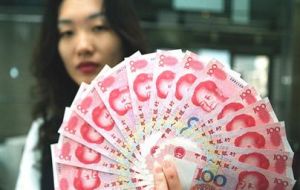MercoPress. South Atlantic News Agency
China's Yuan first steps to replace US dollar in Asian trade

China has said it is to allow some trade with its neighbours to be settled with its currency the Yuan. The pilot scheme was announced in a package of measures designed to help exporters hit by the global downturn.
It means if the two parties to a trade have Yuan available, they need not enter world exchange markets to pay. Most of China's foreign trade is settled in US dollars or the euro, leaving exporters vulnerable to exchange rate fluctuations. The yuan is not yet a freely convertible currency. However officials did not say when the trial scheme would start. When it does, the Yuan could be used to settle trade between parts of eastern China (Guangdong and the Yangtze River delta) and the territories of Hong Kong and Macau, and between south-west China (Guangxi and Yunnan) and the Asean group of countries (Brunei, Burma, Cambodia, Indonesia, Laos, Malaysia, the Philippines, Singapore, Thailand and Vietnam). Analysts told Chinese media that the Yuan was already being used in some South East Asian countries and that China was happy to see such use extended. They also agreed that the measure was intended to help companies cope with the global financial meltdown, even though buying and selling the currency requires the presentation of legitimate trade documents to banks. The latest measure follows Beijing's announcement earlier this month of a 30-point directive in which it vowed to "support the development of Yuan business in Hong Kong" and expand the use of the currency to settle trade with neighbouring countries. Central bank governor Zhou Xiaochuan was quoted by the South China Morning Post as saying: "The US dollar is unlikely to be stable next year and later. And the likelihood of the United States issuing more money in the near future adds to the depreciation risk in US-dollar-denominated assets and trade settlements". He also reportedly said that Guangxi, a province in southern China, had already been settling trade with Vietnam in Yuan for some time. A document released after a meeting of China's State Council on Wednesday announced more measures to stimulate domestic consumption. These include subsidies to rural households for the purchase of household appliances and other goods, and the setting up of new stores and distribution centres in rural areas. The document called for the renovation of urban food markets, the provision of more variety of goods on sale, the setting up of more second-hand markets, incentives for distribution companies to merge and consolidate, and support of small and medium-sized enterprises. The state news agency Xinhua said the government intended to raise export tax rebates for high-technology products, to encourage foreign investment, extend customs and inspections services, lower inspection fee for exports and strengthen trade relations in emerging markets. Analysts said the ideas, though vague, indicated growing concern among China's policy makers about the domestic impact of the current global financial turmoil. Powered by exports, China's economy has grown by double digits in recent years but 2009 prospects are not so encouraging. In November, official figures showed a 2.2% drop in exports, the first decline in more than seven years




Top Comments
Disclaimer & comment rulesCommenting for this story is now closed.
If you have a Facebook account, become a fan and comment on our Facebook Page!